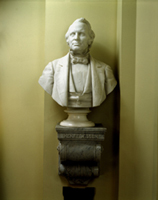Consider for a moment — there’s no reason it must be this moment, but here it is anyway — the life of U.S. Vice President Jeremiah Jones Colbath. No — not a household name. In fact, if you look at a list of all the men who have served as No. 2, from John Adams to the current incumbent, you won’t find him. But he did serve.
When I was tapping out those president and vice president posts last month, I mentioned at one point being surprised at the number of vice presidents who had died in office. One of those was Henry Wilson, who was the second of Grant’s vice presidents. He suffered a stroke while in the Capitol in November 1875. Wilson was taken to the vice president’s suite, near the Senate floor, and died nearly two weeks later, on November 22.
The official biography includes a wonderful quote from one of Wilson’s eulogizers: “He was not learned, he was not eloquent, he was not logical in a high sense, he was not always consistent in his political actions, and yet he gained the confidence of the people, and he retained it to the end of his life.” The trust of the people, the Senate writeup suggests, came from his tireless habit of sounding out everyone he encountered about the issues of the day. “Confidence of the people” might be a little bit of a stretch, considering candidates for the U.S. Senate were elected by legislatures rather than popular vote until well into the 20th century. Reading about Wilson, you get the picture of someone who rose above the station that lack of learning, eloquence and logic “in a high sense” might have reserved for him — perhaps that of a modestly successful political hack. He had more than enough ambition, drive and smarts to play the game and become a master operator. A 1964 journal article on him was titled, “Henry Wilson: Unprincipled Know-Nothing,” a reference to Wilson’s abandonment of his stated anti-slavery stance in the early 1850s to secretly join the nativist, racist Know-Nothings in order to win support in an election.

That started him on the path to prominence in Republican politics — he became a leader of the party’s radical wing during the Civil War and unsuccessfully campaigned for measures that would ensure racial equality after the war. When he died, the Senate was moved enough by his passing that it commissioned a bust eventually executed by Daniel Chester French, better known for sculpting the statue in the Lincoln Memorial, The Republic, a centerpiece of the 1893 World’s Columbian Exposition in Chicago. and the Concord Minuteman in Massachusetts. Among others.
[It’s late; to be continued.]
